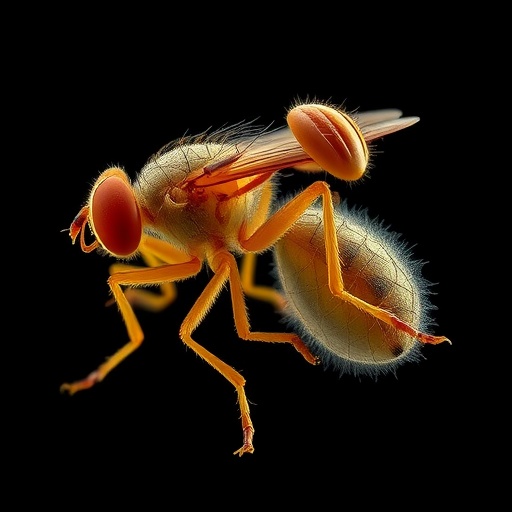GRAND RAPIDS, Mich. (August 18, 2025) — The early developmental phase of embryos remains one of the most critical yet understudied windows in biology, particularly concerning how an embryo transitions from maternal nutrient dependency to self-sustained metabolism. A groundbreaking study recently published by scientists at Van Andel Institute offers unparalleled insight into this pivotal process using fruit fly (Drosophila melanogaster) embryos as a model. By leveraging cutting-edge single-embryo metabolomics and transcriptomics techniques, the study illuminates the intricate biochemical shifts governing early embryonic development, with implications that may extend to understanding human health and disease.
Traditionally, studies on embryonic metabolism have relied on pooled data from multiple embryos, thus masking individual variability and temporal nuances. The Van Andel Institute team overcame these limitations by adopting a technically sophisticated method that simultaneously profiles metabolites and gene expression within individual embryos. This approach reveals a highly dynamic metabolic handoff, a transition period during which the embryo gradually assumes control of its metabolic functions from maternally supplied nutrients.
At the heart of this process, metabolites—the small molecules involved in metabolism—undergo a coordinated transformation. Early-stage fruit fly embryos depend heavily on maternal metabolites deposited in the oocyte to fuel rapid cell division and differentiation. Over time, there is a systematic replacement with metabolites synthesized de novo by the embryo itself, coordinated with changes in transcriptomic activity that reflect the activation of embryonic genomes. Untangling this sequence sheds light on crucial developmental checkpoints and metabolic regulatory pathways.
This study’s innovative approach also involves a detailed temporal resolution of metabolic states during key embryonic stages. Single-embryo analysis unveiled distinct metabolic signatures correlating with developmental milestones, such as the mid-blastula transition—a known point at which zygotic genome activation occurs in Drosophila. By mapping metabolomic profiles alongside transcriptomic data, researchers piece together a comprehensive picture of metabolism’s role in governing developmental timing and outcomes.
One of the most compelling findings centers on metabolites associated with energy production and biosynthetic processes. The data suggest that embryos initially utilize maternally derived substrates to generate ATP and basic biosynthetic precursors. As embryogenesis progresses, the molecular machinery shifts towards endogenous metabolic pathways, encompassing glycolysis, the tricarboxylic acid (TCA) cycle, and amino acid biosynthesis, thereby ensuring metabolic independence.
The choice of fruit flies as a model system is deliberate and strategic. Drosophila shares a significant proportion—approximately 65% to 75%—of disease-associated genes with humans, thus providing a powerful platform to study conserved developmental and metabolic pathways. Their rapid reproductive cycle and relatively simple genome make them ideal for high-throughput and detailed single-embryo analyses that would be impractical in more complex organisms.
Beyond its foundational biological insights, this study serves as a methodological benchmark. Combining single-cell or single-embryo metabolomics with transcriptomics at high resolution offers a template for future investigations across diverse organisms. Such methods enable exploration of how metabolic regulation intersects with gene expression during periods of rapid biological transformation, including development and disease progression.
The implications of these findings extend into biomedical research realms. Understanding embryonic metabolic dynamics could enhance our grasp of congenital disorders and metabolic diseases by identifying early metabolic biomarkers or critical windows for intervention. Additionally, insights gained may inform regenerative medicine and stem cell biology, where metabolic state shifts underpin cell fate decisions.
The research team, led by Adelheid (Heidi) Lempradl, Ph.D., assistant professor at Van Andel Institute, emphasizes the broader significance of decoding metabolic handoffs. “Development establishes the foundation for health throughout life,” Lempradl said. “Our new single-embryo technique exposes previously hidden layers of complexity, presenting a clearer picture of early metabolic regulation that could transform how we approach developmental biology and disease.”
Eduardo Pérez-Mojica, Ph.D., the study’s first author, together with colleagues Zachary B. Madaj, M.S., Christine N. Isaguirre, Joe Roy, Kin H. Lau, Ph.D., and Ryan D. Sheldon, Ph.D., meticulously integrated metabolomic profiles with transcriptomic analyses, producing a high-resolution dataset poised to benefit the scientific community in metabolomic research.
Funded partly by Van Andel Institute and the Metabolism & Nutrition Program’s Pathway to Independence Award, the study represents a vital step forward in resolving the biochemical and genetic blueprints that guide early life. As the field of metabolomics continues to grow, such detailed investigations are critical in bridging the gap between molecular function and organismal health from life’s earliest moments.
Moreover, the research highlights how advances in analytical chemistry, bioinformatics, and sequencing technologies converge to unravel the complexities of biology at unprecedented depth. The application of mass spectrometry for metabolite detection, combined with next-generation sequencing for transcriptomics, sets a new standard for multi-omic studies that dissect temporal and spatial biological phenomena.
In sum, the Van Andel Institute’s study spearheads a new era of developmental metabolic research. By clarifying the metabolic trajectories and genetic programs of single embryos, it paves the way for innovations in understanding developmental disorders, metabolic diseases, and evolutionary biology. As researchers worldwide build upon this work, the foundational insights derived from fruit fly embryos promise to ripple into wide-ranging scientific and medical arenas.
Subject of Research: Early embryonic metabolism and metabolic independence transition in Drosophila melanogaster embryos.
Article Title: Resolving early embryonic metabolism in Drosophila through single-embryo metabolomics and transcriptomics
News Publication Date: August 18, 2025
Web References:
- Van Andel Institute: http://www.vai.org/
- Nature Metabolism article: https://www.nature.com/articles/s42255-025-01351-5
- DOI link: http://dx.doi.org/10.1038/s42255-025-01351-5
References:
Pérez-Mojica, E., Madaj, Z. B., Isaguirre, C. N., Roy, J., Lau, K. H., Sheldon, R. D., & Lempradl, A. (2025). Resolving early embryonic metabolism in Drosophila through single-embryo metabolomics and transcriptomics. Nature Metabolism. https://doi.org/10.1038/s42255-025-01351-5
Keywords: Metabolic regulation, embryonic metabolism, metabolomics, transcriptomics, Drosophila melanogaster, maternal nutrient handoff, developmental biology, single-embryo analysis, metabolite profiling




